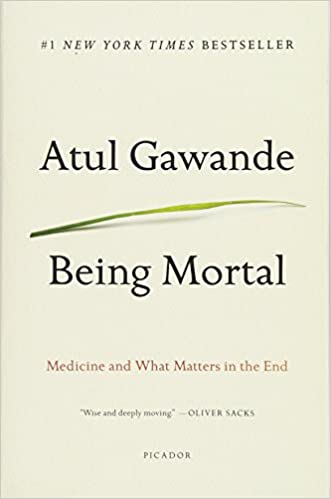Dealing with what life throws at you is a challenge, and if you’re struggling with this, you’re not alone.
Do you want to know how to manage the difficult moments by focusing on a few key strategies? And how to enjoy and thrive, even when life throws curveballs at us?

Being Mortal
by Atul Gawande
⏱ 15 minutes reading time
🎧 Audio version available
Stay in the moment, at least some of the time
Focusing on the present is a great way to connect with yourself. Harmonizing with your feelings and your body and relaxing your thoughts can bring a sense of calm. Our minds often get stuck focusing on the future, worrying, planning, even obsessing. In reality, the future is never certain. In fact, how many of your life plans worked out when you were younger?
Things probably didn’t turn out how you thought they would. But still, for the most part, things have turned out OK, perhaps even better than expected? Without even touching on the current state of affairs, many jobs and technology didn’t exist when you first began considering what you might want your life and career to be.
Rather than focus on planning ahead right now, perhaps you could focus on yourself and developing your skills, learning about what you appreciate, and caring for yourself, so you can embrace the future, whichever way it goes.
Don’t always look for safety in numbers
When things are tough, it’s natural to search for people in the same position as you. It’s comforting to know we’re not the only ones, and there is definitely value in realizing that everyone copes with ups and downs. However, everyone and every situation are unique.
What helped you might not work for someone else, so find the pathway and solutions that are precisely right for you. At first glance, someone might seem to be in the same situation as you but analyze a little deeper, and those comparisons will vanish. Instead, surround yourself with comrades who can inspire you, walk with you, and encourage you to find your own way forward.
Cut ‘should’ from your self-talk vocabulary
Stop telling yourself you ‘should’ things! ‘Should’ leaves you feeling guilty, confused, and inadequate. Quick tip – change ‘should’ for ‘want’! Instead of thinking, ‘I should be exercising every day.’ Turn it into ‘I want to exercise every day.’ This tiny change helps us reframe our self-talk, which helps you to act out of self-compassion, not obligation and guilt.
It’s OK to be sad. It’s also OK to be happy.
When life gets tough, we sometimes stop giving ourselves permission to also enjoy the good moments. Even in our darkest times, there is room for joy. It’s one of our body’s coping mechanisms, it gives us a small break, and it reconnects us with others and ourselves.
Life is full of moments, both beautiful and devastating, and they all come together. Let yourself notice the good, look for it, and appreciate it. If you find you’re happy, enjoy it, celebrate it, and recollect it later. Happiness and sadness can, and need to, coexist.
Be curious about the change
The one consistency in life is change. Change can be terrifying, but it can also be energizing, opening up new opportunities and challenging you to grow and explore various parts of yourself. It doesn’t feel natural; it often feels actively uncomfortable.
Everyone has a comfort zone, and the closer we get to the edge of it, the more frightening it gets. But this is also where there is enormous potential for you to explore life, learn to understand yourself better, recognize what makes you tick, and the kind of people you want to surround yourself with.
Find your anchors
We can’t always control what happens to and around us in life, which can be unsettling. To help you in these moments, find your ‘anchors,’ the things that ground you, help you feel calm, and guide you through these stormy times.
Probably it’s a routine – the same breakfast every day or a moment for a coffee or tea each morning. Perhaps it’s a hobby, or maybe it’s a friend you talk with regularly. Maybe you find a bit of time every day to ground yourself, or go for a run, listen to music, or journaling. Find what helps you and use it to guide you through life’s ups and downs.
Remember to set boundaries with others
Everyone has been affected by the pandemic, some in more ways than others. While you want to support friends and family, it’s crucial to maintain your own mental health boundaries. For many people, establishing boundaries can feel harsh and distressing, but boundaries are at the core of our wellbeing.
If you feel like someone relies on you emotionally, make sure you remember to take care of yourself first. Don’t feel like you have to engage immediately; make sure you prioritize your own self-care. You cannot look after others if you don’t take care of yourself first.
Stay connected
When you’re struggling, it can be appealing to withdraw and isolate yourself. It’s not easy to tell people how you’re feeling, and it can be even more complicated when you pretend that you’re OK when you’re not.
But connecting with others can help you in getting some of those difficult feelings out into the open, where you can digest them and hopefully decrease them. Having a talk with someone can be one of the most effective things you can do, whether it’s an expert, a friend, someone you trust, or even talking to a total stranger in a safe context.
Ask yourself, “and then what?” when you’re tight on an anxious thought.
Not every anxious thought is rational. Ask yourself, “and then what?” to think further ahead. This helps us to clear the thoughts that are unreasonable, illogical, or improbable.
Know that you’re not alone
Life is hard, and we don’t say it enough. Too often, we put a smile on our faces and pretend that everything is wonderful, even when it isn’t. We all know deep down that this isn’t helpful. We end up feeling more alone than ever since we can’t talk honestly about how we’re feeling.
But if there’s one thing you take from this video, let it be this: you are not alone. We are all in the same boat, and you don’t have to walk the road alone.
Everyone experiences disappointments and unforeseen moments from time to time. But if you’re exhausted from regularly reacting to the ups and downs in your life, it’s time to step back and consider how you respond to things.
Inner peace comes from accepting and appreciating life, even with all its quirks and bumps. It’s about doing what you can, understanding that sometimes, the path you take will have unexpected turns.
The process of growing and learning can be challenging. It can be downright scary. But if you manage to weather the storms that come your way, you’ll come out stronger than before.
Are you retaking control of your life right now? Do you have any personal stories or experiences to share about losing control of your life?
What Is Snapreads?

With the Snapreads app, you get the key insights from the best nonfiction books in minutes, not hours or days. Our experts transform these books into quick, memorable, easy-to-understand insights you can read when you have the time or listen to them on the go.



